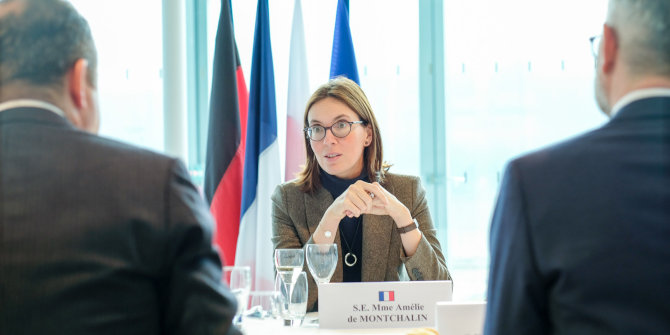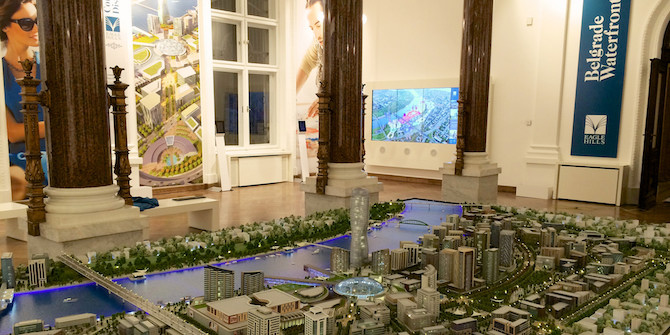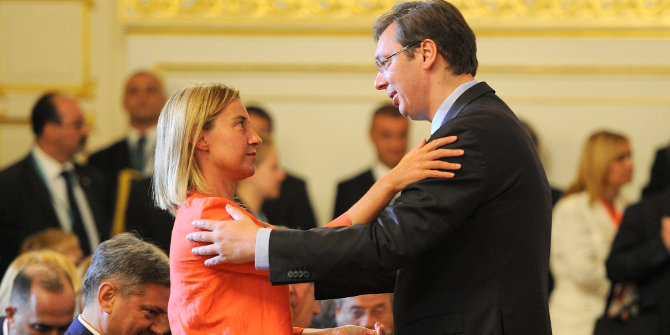 The city of Tirana has been awarded the title of European Youth Capital for 2022. Epidamn Zeqo, Director of Strategic Planning and Implementation of Priorities for the Municipality of Tirana, explains what the award means for the city and for Albania as a whole. He writes that despite disappointment at the EU’s decision to block the start of membership talks with Albania and North Macedonia, young people in Albania have shown there is still some hope for future integration in the region.
The city of Tirana has been awarded the title of European Youth Capital for 2022. Epidamn Zeqo, Director of Strategic Planning and Implementation of Priorities for the Municipality of Tirana, explains what the award means for the city and for Albania as a whole. He writes that despite disappointment at the EU’s decision to block the start of membership talks with Albania and North Macedonia, young people in Albania have shown there is still some hope for future integration in the region.
There is a sense of irony that it was Emmanuel Macron, elected by many with the promise to save Europe from Marine Le Pen, who dealt a fatal blow to the EU enlargement process when he vetoed accession negotiations with Albania and North Macedonia. President Macron’s position has been criticised by his colleagues, in particular by German Chancellor Angela Merkel, who maintains a status quo position on the region’s potential path to EU membership. Many stakeholders and commentators have called Macron’s decision or lack of a decision a ‘historic mistake’. Indeed, similar to the Brexit referendum and the election of President Trump, it has shattered the mirror (in this case of the EU perspective for the region outlined at the Thessaloniki Summit in 2003).
With this said, integration hopes in the region have not yet vanished, especially in Albania’s capital city, Tirana, which has just been awarded the status of European Youth Capital for the year 2022 – an announcement made at a ceremony in the French city of Amiens, attended by none other than President Macron himself. Tirana’s programme for 2022, with the slogan ‘Activ∞ Youth’ (Activate Youth), was written by youth organisations and supported by the Municipality of Tirana. It was judged favourably by the independent jury against other competitive applications by the finalist cities, three of which are in the EU: Baia Mare, Poznań, Varaždin, and Kazan (Russia).

Tirana, Credit: Lassi Kurkijärvi (CC BY-NC 2.0)
This is a unique opportunity to increase youth trans-national exchanges in Tirana, and to fund youth projects, including cross-border initiatives with former and current European Youth Capital winners. In particular, it will help to activate Tirana’s youth (Albania’s future decision-makers) to participate politically, to embrace diversity and European values, and to create an innovative economy whilst at the same time protecting the environment and their own health. The award also shows the determinant role cities like Tirana and Skopje have in their country’s EU integration process.
I have previously written on Albania’s many challenges for EU accession, warning against the tendency to focus on the technical process which is managed by supranational institutions like the EU Commission and Parliament, whilst ignoring the determinant role of the political process managed by inter-governmental institutions like the EU Council. The situation has clearly fostered a myopic view of the region’s challenges as many actors did not foresee the current paradox.
On the one hand, the EU’s supranational institutions have judged, based on a transparent methodology with indicators, that both Albania and North Macedonia fulfil the technical conditions (e.g. progress on judicial and anti-corruption reforms) to immediately start accession negotiations. On the other hand, President Macron has judged, probably based on domestic political calculations, that both countries do not meet the conditions and that the conditions are likely inadequate in any case. Another element of irony here is that while France defied the Commission’s recommendation on this occasion, the last time it did so it was to speed up, not slow down, the membership of Bulgaria and Romania in 2007.
France’s “Strategy for the Western Balkans” seems more concerned with catching-up with Germany’s engagement in the region by strengthening the role of the French Development Agency (AFD), rather than offering a superior enlargement process to better prepare candidate countries for membership. President Macron should consider that the real problem is not foreign influence in the region, but that Albania and North Macedonia are proud European nation states that are being barred from joining the European Union. Western Balkans countries would be well advised to organise, like the central Europeans did with the Visegrád Group in the early 1990s, to secure accession as soon as possible. The youth of Tirana and of other cities in the region and in Europe have to be empowered so they can help build the city, the country, and the Union they would like to live in today and tomorrow.
Please read our comments policy before commenting.
Note: This article gives the views of the author, not the position of EUROPP – European Politics and Policy or the London School of Economics.
_________________________________
 Epidamn Zeqo
Epidamn Zeqo
Epidamn Zeqo holds an MSc in European Political Economy from the London School of Economics and a dual MA in International Relations and Modern History from the University of St. Andrews. He is currently the Director of Strategic Planning and Implementation of Priorities for the Municipality of Tirana.






Very informative as I did not know about this issue. Very short-cited of Macron. Straight-arming a friendly country to blunt German influence is to play into Russian aggression and designs.